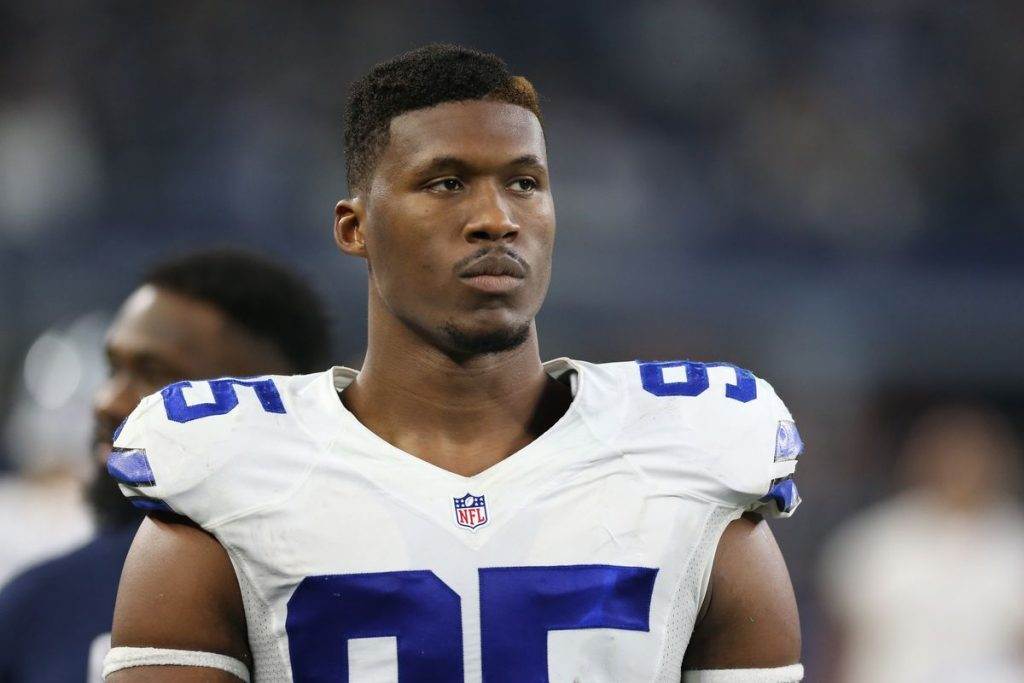One of the biggest names the Dallas Cowboys have entering free agency this offseason is defensive lineman David Irving. Unlike his teammate DeMarcus Lawrence, Irving will be classified as a “restricted free agent”. What does this mean, and how does it impact Irving’s likelihood to stay with the Cowboys?
A player must have at least four “accrued seasons” to qualify for unrestricted free agency. For example, Lawrence entered the league in 2014 and has played out his four-year rookie deal. Therefore, unless Dallas re-signs him before March or uses the franchise tag, DeMarcus can sign anywhere he wants and the Cowboys can’t stop it.
Irving does not have those four accrued seasons.
He was an undrafted rookie in 2015 and did not get the typical four-year rookie deal. Dallas signed him off the Kansas City Chiefs practice squad that year. So now in 2018, Irving’s current deal is expiring but he only has three accrued seasons towards free agency. Therefore, he is restricted.

Restricted free agency is a mechanism that helps NFL teams keep players they’ve spent time developing.
The Cowboys can place an RFA tender on David Irving this year and retain the option to match any offer another team might make. Depending on the level of RFA tender Dallas uses, they can receive draft pick compensation from Irving’s new team if the Cowboys decline to match.
The amount that David Irving will make in 2018 depends on the level of protection the Cowboys give him as a restricted free agent. The highest level requires a first-round pick in return and will likely pay a little over $4 million in 2018.
A second-round tender should pay close to $3 million; these amounts will be finalized closer to the start of free agency in March.
The third and final level will only pay about $2-million and comes with “original draft pick” compensation. For an undrafted guy like David Irving, that means all Dallas gets is the opportunity to match his offer. They won’t get any draft pick compensation from the lowest RFA tender.
You can forget about that lower level, though. David Irving is one of the more exciting young defensive linemen in the league and is still just 24 years old. If Dallas wants to keep him, they will have to use at least a 2nd-round RFA tender to keep other teams at bay.
Not only is Irving young and versatile, but he’s productive. He had seven sacks in just eight games in 2017. David missed the first four weeks from a PED suspension and then the last four due to a concussion. Assuming all such issues are behind him next year, Irving has potential to become a weekly game-changer for the Cowboys defense.
Without the baggage, Irving would be a slam dunk for the 1st-round RFA tender.
A $4-million salary is a steal for a dynamic defensive lineman who can get to the quarterback. Given Irving’s age and what he’s already shown on the field, there are teams that might even be tempted to surrender a late first-round draft pick to sign him.
But Irving’s baggage can’t be ignored. It cost him four games in 2017 and is the reason he went undrafted in the first place.
When asked about Irving returning to Dallas, Cowboys insider Bryan Broaddus responded:
Do they really trust the player? https://t.co/LqyvFLQKg8
— BryanBroaddus (@BryanBroaddus) December 29, 2017
David Irving was dismissed from the Iowa State football team in 2014 due to his involvement in a campus riot. His PED suspension this year came — per Irving — from a sponsor’s workout drink that did not disclose the banned substance in its ingredients. These hardly seem enough for the Cowboys to have doubts about Irving, so Broaddus’ comments may speak to some other maturity issues we’re not aware of.
This is pure speculation, of course, but the Cowboys staff media doesn’t say things like that about a player without a reason.
That said, it’s hard to imagine Dallas not using one of the two RFA tenders on David Irving. He’s too young and exciting to let him go for nothing.
The 1st-round tender is only about an extra $1 million from the 2nd-round tender, so that’s a lot of extra protection for a relatively small additional cost.
The Cowboys could elect to use the 2nd-round tender for one of two reasons.
- One, obviously, is if they don’t think another team will sign him and they can save that $1-million in cap space.
- The other is that the 2nd-round pick might be enough to entice another team. A 24 year old with David Irving’s physical skills and proven production may be more attractive than some mid-to-late-round rookies. If the Cowboys actually don’t trust Irving, or see him in their future plans, they might be able to snag a second-round pick instead of losing him for nothing.
Answers are only a few months away. We’ll see very soon just where David Irving stands with the Cowboys and how much they want to keep him.